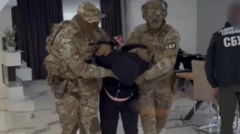In recent weeks, Hungary has found itself at the center of a diplomatic crisis with Ukraine, following the emergence of espionage allegations that seem to have political underpinnings. Accusations directed at Prime Minister Viktor Orban's government suggest they may be exploiting the situation to undermine the opposition, particularly the Tisza party, as Hungary gears up for the critical 2026 elections.
The controversy began when Ukraine's SBU security agency revealed the arrests of two individuals accused of spying for Hungary, with claims that they were allegedly working for Hungarian military intelligence regarding potential incursions into Ukraine. The conflict escalated quickly, leading to the expulsion of diplomats from both nations and a series of arrests, including a Ukrainian man charged with espionage.
Orban, who is viewed within the EU as a close ally of Russia, has faced increasing scrutiny for his government's actions. He has resisted EU sanctions against Russia and refused to allow arms transit to Ukraine, even equating Ukraine's situation to that of Afghanistan. Recently, he accused Kiev of attempting to tarnish Hungary’s reputation and instigated a campaign—distributed through millions of questionnaires—inviting citizens to reject Ukraine’s EU candidacy.
The political landscape has shifted considerably since Orban last presented himself as a peace broker in the conflict. Following an unsettling meeting with Vladimir Putin, where Russian missiles struck a hospital in Kyiv shortly after his visit, critics have suggested Orban's initiatives only serve to appease Russian aggression rather than promote peace.
One prominent figure in the opposition, Tisza Party leader Peter Magyar, noted that he provided medical assistance to a Ukrainian hospital after a Russian attack. As relations remain strained, his associate, Roland Tseber, has also faced backlash from the ruling Fidesz party, which has labeled him a "Ukrainian spy."
Tseber, an independent councillor in Transcarpathia, denied these allegations, insisting that he is serving his community responsibly. He expressed bewilderment at being implicated in such accusations, stating that he is engaged in shared humanitarian efforts and political dialogue.
Despite the hostilities, many Hungarians have continued to send medical supplies to Ukraine, showcasing a commitment to aiding their neighbors despite their government's stance. As the diplomatic fallout continues, remnants of Hungary's community within Ukraine have become collateral damage, with an estimated decline from 150,000 to 70-80,000 since the last census, compounded by the ongoing war.
An additional layer of complexity is introduced by Romulusz Ruszin-Szendi, a former military chief and now a figure in the Tisza party, who has also faced allegations from pro-government media regarding connections to Ukrainian intelligence. Refuting these claims, he declared them a smear campaign against honorable citizens.
As Orban navigates these treacherous political waters, mounting evidence suggests a shift in Hungary’s military strategy aligned with a more aggressive posture in response to the Ukraine conflict. Questions about his government's future and the implications of the ongoing feud with Ukraine lie heavily in the air as the country approaches its pivotal electoral period.
The controversy began when Ukraine's SBU security agency revealed the arrests of two individuals accused of spying for Hungary, with claims that they were allegedly working for Hungarian military intelligence regarding potential incursions into Ukraine. The conflict escalated quickly, leading to the expulsion of diplomats from both nations and a series of arrests, including a Ukrainian man charged with espionage.
Orban, who is viewed within the EU as a close ally of Russia, has faced increasing scrutiny for his government's actions. He has resisted EU sanctions against Russia and refused to allow arms transit to Ukraine, even equating Ukraine's situation to that of Afghanistan. Recently, he accused Kiev of attempting to tarnish Hungary’s reputation and instigated a campaign—distributed through millions of questionnaires—inviting citizens to reject Ukraine’s EU candidacy.
The political landscape has shifted considerably since Orban last presented himself as a peace broker in the conflict. Following an unsettling meeting with Vladimir Putin, where Russian missiles struck a hospital in Kyiv shortly after his visit, critics have suggested Orban's initiatives only serve to appease Russian aggression rather than promote peace.
One prominent figure in the opposition, Tisza Party leader Peter Magyar, noted that he provided medical assistance to a Ukrainian hospital after a Russian attack. As relations remain strained, his associate, Roland Tseber, has also faced backlash from the ruling Fidesz party, which has labeled him a "Ukrainian spy."
Tseber, an independent councillor in Transcarpathia, denied these allegations, insisting that he is serving his community responsibly. He expressed bewilderment at being implicated in such accusations, stating that he is engaged in shared humanitarian efforts and political dialogue.
Despite the hostilities, many Hungarians have continued to send medical supplies to Ukraine, showcasing a commitment to aiding their neighbors despite their government's stance. As the diplomatic fallout continues, remnants of Hungary's community within Ukraine have become collateral damage, with an estimated decline from 150,000 to 70-80,000 since the last census, compounded by the ongoing war.
An additional layer of complexity is introduced by Romulusz Ruszin-Szendi, a former military chief and now a figure in the Tisza party, who has also faced allegations from pro-government media regarding connections to Ukrainian intelligence. Refuting these claims, he declared them a smear campaign against honorable citizens.
As Orban navigates these treacherous political waters, mounting evidence suggests a shift in Hungary’s military strategy aligned with a more aggressive posture in response to the Ukraine conflict. Questions about his government's future and the implications of the ongoing feud with Ukraine lie heavily in the air as the country approaches its pivotal electoral period.




















